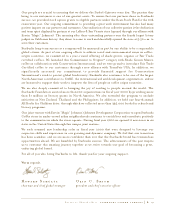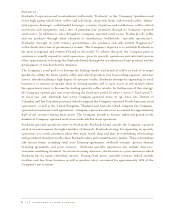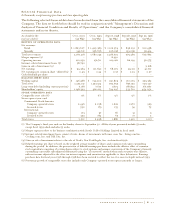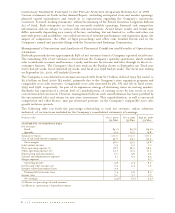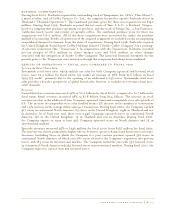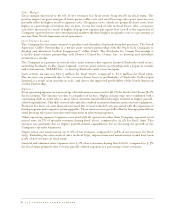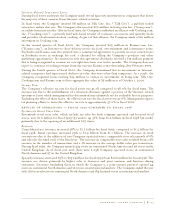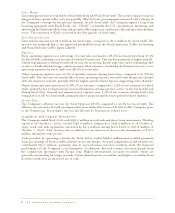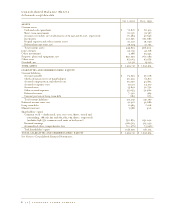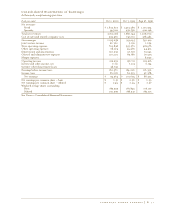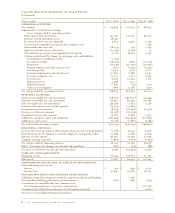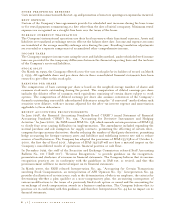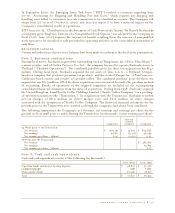Starbucks 2000 Annual Report Download - page 13
Download and view the complete annual report
Please find page 13 of the 2000 Starbucks annual report below. You can navigate through the pages in the report by either clicking on the pages listed below, or by using the keyword search tool below to find specific information within the annual report.
Seasonality and Quarterly Results
The Company’s business is subject to seasonal fluctuations. Significant portions of the Company’s net
revenues and profits are realized during the first quarter of the Company’s fiscal year, which includes the
December holiday season. In addition, quarterly results are affected by the timing of the opening of new
stores, and the Company’s rapid growth may conceal the impact of other seasonal influences. Because of
the seasonality of the Company’s business, results for any quarter are not necessarily indicative of the
results that may be achieved for the full fiscal year.
New Accounting Standards
In June 1998, the Financial Accounting Standards Board (“FASB”) issued Statement of Financial
Accounting Standards (“SFAS”) No. 133, “Accounting for Derivative Instruments and Hedging
Activities.” In June 2000, the FASB issued SFAS No. 138, which amends certain provisions of SFAS 133
to clarify four areas causing difficulties in implementation. The amendment included expanding
the normal purchase and sale exemption for supply contracts, permitting the offsetting of certain
intercompany foreign currency derivatives, thereby reducing the number of third party derivatives,
permitting hedge accounting for foreign-currency assets and liabilities and redefining interest rate risk
to reduce sources of ineffectiveness. The Company has adopted the provisions of SFAS 133/138 as of
October 2, 2000, the first day of fiscal 2001. Adoption of SFAS 133/138 will not have a material impact
on the Company’s consolidated results of operations, financial position or cash flows.
In December 1999, the staff of the Securities and Exchange Commission released Staff Accounting
Bulletin No. 101 (“SAB 101”), “Revenue Recognition,” to provide guidance on the recognition,
presentation and disclosure of revenues in financial statements. The Company believes that its revenue
recognition practices are in conformity with the guidelines in SAB 101, as revised, and that this
pronouncement will have no material impact on its financial statements.
In March 2000, the FASB released Interpretation No. 44, “Accounting for Certain Transactions
involving Stock Compensation: an interpretation of APB Opinion No. 25.” Interpretation No. 44
provides clarification of certain issues, such as the determination of who is an employee, the criteria for
determining whether a plan qualifies as a non-compensatory plan, the accounting consequence of
various modifications to the terms of a previously fixed stock option or award and the accounting for an
exchange of stock compensation awards in a business combination. The Company believes that its
practices are in conformity with this guidance, and therefore Interpretation No. 44 has no impact on its
financial statements.
In September 2000, the Emerging Issues Task Force (“EITF”) reached a consensus regarding Issue
00-10, “Accounting for Shipping and Handling Fees and Costs,” which requires any shipping and
handling costs billed to customers in a sale transaction to be classified as revenue. The Company will adopt
Issue 00-10 as of October 2, 2000, and does not expect it to have a material impact on the Company’s
consolidated results of operations.
EITF Issue 00-15, “Classification in the Statement of Cash Flows of the Income Tax Benefit Realized by
a Company upon Employee Exercise of a Nonqualified Stock Option,” was adopted by the Company in
fiscal 2000. Issue 00-15 requires the income tax benefit resulting from the exercise of nonqualified
stock options to be classified as cash provided by operating activities in the consolidated statements of
cash flows.
starbucks coffee company P. 29


